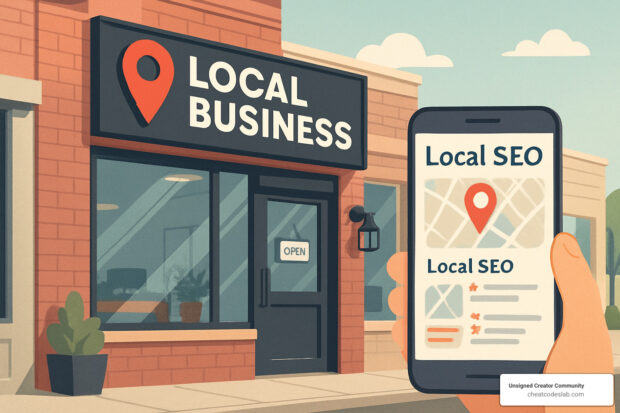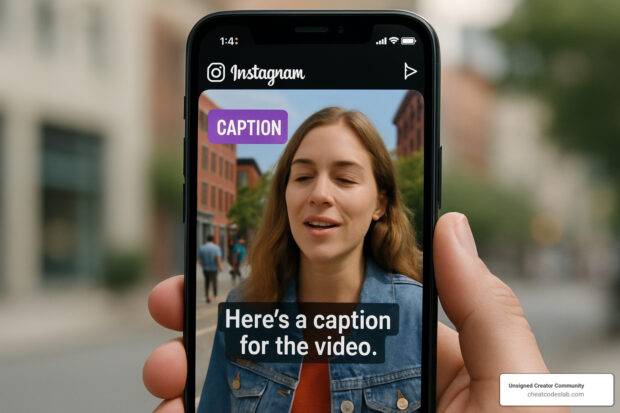
SEO cheat codes can transform your online presence from unseen to a sought-after destination. For those hurriedly seeking insights, here’s a quick snapshot:
- Focus on Conversions: It’s not just about traffic; it’s about what visitors do on your site.
- Compound Your Efforts: Small, steady steps lead to big results over time.
- Pick Your Battles: Avoid high-competition keywords and find hidden gems.
- Off-Page Strategy: Secure backlinks from credible sources to boost authority.
- Local Visibility: Optimize for local searches to reach nearby customers effectively.
Navigating the vast terrain of search engine optimization (SEO) can feel overwhelming. This comprehensive guide promises straightforward strategies and actionable tips that even seasoned marketers can use to lift their efforts. SEO is not just about piling up tips; it’s about implementing cheat codes that truly make a difference.
I’m digitaljeff, a dynamic content strategist and tech entrepreneur, passionate about empowering creators with effective SEO cheat codes. From launching successful ventures to innovating content strategies, I’ve learned how game-changing these techniques can be. Let’s dive deeper and explore how these cheat codes can boost your SEO.

Essential SEO Cheat Codes
Navigating SEO can be daunting, but with a few SEO cheat codes, you can open up the potential of your online presence. Let’s break down some essential strategies that can make a significant impact:
Long-Tail Keywords
Long-tail keywords are longer and more specific phrases that users type into search engines. Unlike broad keywords, they face less competition and often lead to higher conversion rates. For example, instead of targeting “shoes,” focus on “best running shoes for flat feet.” This specificity helps attract users ready to make a purchase.
Evergreen Content
Evergreen content remains relevant and valuable over time. Articles like “How to Tie a Tie” or “Beginner’s Guide to Gardening” continue to attract readers long after publication. By creating content that withstands the test of time, you ensure a steady stream of traffic to your site.
User Search Intent
Understanding user search intent is crucial. Are users looking for information, making a purchase, or comparing products? Tailoring your content to meet these needs improves user experience and search rankings. High-quality content that aligns with search intent keeps visitors engaged and encourages them to explore further.
Image Optimization
Images improve content but can slow down your site if not optimized. Compress and resize images, use descriptive alt text, and choose appropriate file formats like JPG or WebP. Proper image optimization improves site speed and accessibility, benefiting both users and search engines.
High-Quality Backlinks
Backlinks from reputable sites boost your domain authority. Aim to secure links from authoritative sources through guest posts, infographics, or collaborations. Quality trumps quantity, so focus on building genuine connections that improve your site’s credibility.
Compelling Titles and Meta Descriptions
Your title and meta description are the first things users see in search results. Craft clickable headlines that include your target keyword and promise value. Meta descriptions should provide a concise summary of your content, enticing users to click through. Avoid truncation by keeping them under 160 characters.
Responsive Design
A responsive design ensures your website looks great on all devices, from desktops to smartphones. With mobile-first indexing, Google prioritizes mobile-friendly sites. Ensure your site is responsive to improve user experience and maintain strong search rankings.
Google Business Profile
For local businesses, a Google Business Profile is vital. Optimize your listing with accurate information, engaging photos, and customer reviews. Encourage satisfied customers to leave detailed reviews, as these can significantly impact local search visibility and conversions.
By implementing these SEO cheat codes, you can improve your site’s visibility, attract more targeted traffic, and provide a better user experience. Now, let’s dig into on-page SEO strategies that further optimize your content for search engines and users alike.
On-Page SEO Cheat Codes
On-page SEO is all about optimizing the elements on your website to improve visibility and user experience. Here are some key areas to focus on:
Title Tags
Title tags are the clickable headlines that appear in search results. They play a crucial role in attracting users to your site.
-
Target Keyword: Make sure your title tag includes your main keyword. This helps search engines understand what your page is about.
-
User Attention: Craft a compelling title that grabs attention. Use action words or numbers to entice clicks. For example, “Top 5 Tips for SEO Success.”
-
Length: Keep your title between 50-60 characters to avoid truncation in search results.
Headers
Headers (H1 to H6) organize your content, making it easier to read and understand.
-
Content Organization: Use headers to break up text and guide users through your content.
-
H1 Tag: This is your main title and should include your primary keyword.
-
Relevant Keywords: Incorporate keywords naturally into your headers to signal the content’s focus to search engines.
Search Intent
Understanding and addressing search intent is vital for creating content that satisfies users.
-
User Experience: Ensure your content aligns with what users are searching for, whether it’s informational, transactional, or navigational.
-
Search Query: Tailor your content to answer the user’s query comprehensively.
-
High-Quality Content: Provide valuable information that meets the user’s needs, encouraging them to stay longer on your page.
Keywords
Keywords are the phrases users type into search engines. Effective keyword use is key to on-page SEO.
-
Long-Tail Keywords: Focus on specific, less competitive phrases to target niche audiences.
-
Keyword Integration: Place keywords naturally throughout your content, including titles, headers, and body text.
-
Avoid Keyword Stuffing: Overusing keywords can harm your rankings. Aim for a natural flow.
Meta Descriptions
Meta descriptions provide a brief overview of your page’s content in search results.
-
Context for Web Page: Summarize what users can expect from your page.
-
Target Keyword: Include your primary keyword to improve visibility.
-
Truncation: Keep descriptions under 160 characters to prevent them from being cut off.
Images
Images improve engagement but need optimization to avoid slowing down your site.
-
Resize and Compress: Ensure images are the right size and compressed to improve load times.
-
Alt Text: Use descriptive alt text to explain the image. This helps with accessibility and SEO.
-
File Names: Name your files with relevant keywords using hyphens, e.g., “seo-tips-guide.jpg.”
Internal Linking
Internal links are hyperlinks that point to other pages on your website.
-
Crawlers: Help search engines index your site by linking to important pages.
-
Link Equity: Distribute authority throughout your site by linking to key pages.
-
Anchor Text: Use descriptive anchor text that reflects the linked page’s content.
By focusing on these on-page SEO cheat codes, you’ll improve your site’s visibility and user experience. Next, we’ll explore technical SEO strategies to support your on-page efforts.
Technical SEO Cheat Codes
Technical SEO focuses on optimizing your website’s infrastructure to improve performance, user experience, and search engine understanding. Let’s explore some SEO cheat codes that can boost your technical SEO.
Page Speed
Page speed is crucial for both user satisfaction and search engine rankings. Slow pages lead to high bounce rates and frustrated users.
-
Minify Code: Streamline your HTML, CSS, and JavaScript to remove unnecessary characters and spaces. This makes your site load faster.
-
Use a CDN: A Content Delivery Network (CDN) distributes your site’s content across multiple servers worldwide, reducing load times for users everywhere.
-
Browser Caching: Enable caching to store page resources on a user’s device, so repeat visits are faster.
-
Image Compression: Compress images to reduce their file size without losing quality. Tools like TinyPNG can help.
-
Reduce Redirects: Each redirect delays page loading, so keep them to a minimum.
Site Structure
A well-organized site structure improves navigation and helps search engines understand your content.
-
Topic Cluster Model: Group related content around central pillar pages to boost topical authority.
-
Hierarchy: Arrange your content from broad to specific, ideally no more than three clicks deep.
-
Breadcrumbs: Show users their path within your site, improving navigation and user experience.
-
Tags: Use tags to categorize content, making it easier for users and search engines to find related information.
Duplicate Content
Duplicate content confuses search engines, leading to poor rankings.
-
Canonical Tag: Use this tag to indicate the preferred version of a page to search engines.
-
301 Redirects: Direct users and search engines from duplicate pages to the main version.
-
Delete Duplicates: Remove unnecessary duplicate content to streamline your site.
Multilingual SEO
Optimize your site for global audiences with multilingual SEO techniques.
-
Hreflang Tags: Use these tags to tell search engines which language and region your content targets.
-
Local IP Address: Host content on a local server to improve connection with foreign markets.
-
Market Research: Understand the preferences and search behavior of your international audience.
Mobile Responsiveness
With mobile-first indexing, your site must be optimized for mobile devices.
-
Responsive Design: Ensure your site adapts to different screen sizes for a seamless user experience.
-
Mobile-First Indexing: Google prioritizes the mobile version of your site, so optimize content accordingly.
-
Meta Descriptions and Title Tags: Keep these concise and relevant for mobile users.
XML Sitemap
An XML sitemap acts as a roadmap for search engines, ensuring all your pages are indexed.
-
Blueprint: Create a comprehensive list of your site’s URLs.
-
Submit to Search Engines: Use tools like Google Search Console to submit your sitemap.
-
Sitemap Generator: Tools like Yoast SEO can help generate and update your sitemap automatically.
Schema Markup
Schema markup provides additional context to search engines, enhancing how your content appears in search results.
-
Structured Data: Use schema to add context to your content, helping search engines understand it better.
-
JSON-LD: This is the preferred format for adding schema markup to your site.
-
Rich Snippets: Schema can lead to improved search listings, like ratings and images, which improve click-through rates.
By implementing these technical SEO cheat codes, you’ll create a more efficient, user-friendly, and search engine-friendly website. Next, we’ll explore strategies for off-page SEO to further boost your site’s authority.
Off-Page SEO Cheat Codes
When it comes to SEO cheat codes, off-page strategies can significantly boost your site’s authority and visibility. Let’s explore three key areas: backlinks, social media, and local SEO.
Backlinks
Backlinks are like votes of confidence from other websites. They signal to search engines that your content is valuable and trustworthy. But not all backlinks are created equal. Focus on quality over quantity.
-
Referring Domains: Aim to get links from reputable and diverse websites. Think of these as endorsements from experts in your field.
-
Long-Form Content: Create in-depth articles that provide comprehensive insights. Long-form content tends to attract more backlinks because it offers more value.
-
Infographics: Visual content is highly shareable. Infographics can be a great way to earn backlinks, as others may want to share your visuals on their own sites.
-
Guest Posts: Write articles for other reputable sites in your niche. This not only builds backlinks but also expands your audience.
-
Proprietary Data: Conduct your own research and publish the results. Unique data is highly linkable because it provides new insights that others can’t find elsewhere.
Social Media
While social signals aren’t a direct ranking factor for Google, they play a crucial role in your off-page SEO strategy. Social media platforms help you reach a wider audience and can drive traffic to your site.
-
Consistent Posting: Regular updates keep your audience engaged and coming back for more. Consistency builds trust and authority.
-
Audience Interaction: Engage with your followers through comments and messages. This interaction fosters community and encourages sharing.
-
Click-Worthy Captions: Craft compelling captions that entice users to click and share your content. Use relevant keywords and hashtags to increase visibility.

Local SEO
For businesses with physical locations, local SEO is essential. It helps you connect with potential customers in your area and improve your visibility in local search results.
-
Google My Business: Optimize your Google My Business profile with accurate information. This is crucial for appearing in local search results and Google Maps.
-
Local Keywords: Use keywords that reflect your location and services. This helps local customers find you more easily.
-
Customer Reviews: Encourage satisfied customers to leave positive reviews. Reviews build trust and influence potential customers’ decisions.
-
NAP Citations: Ensure your Name, Address, and Phone number (NAP) are consistent across all online directories. Consistency boosts your local search visibility.
By focusing on these off-page SEO cheat codes, you’ll improve your site’s authority and reach. Next, we’ll tackle some frequently asked questions about SEO cheat codes.
Frequently Asked Questions about SEO Cheat Codes
What are some SEO tips, tricks, or hacks?
SEO can seem like a maze, but with the right SEO cheat codes, you can steer it more effectively. Here are some essential tips:
-
Long-Tail Keywords: These are specific search phrases with lower competition, making it easier for your content to rank. They often have higher conversion rates because they match user intent more closely.
-
Evergreen Content: Create content that remains relevant over time. This type of content continues to attract traffic long after it’s published.
-
User Search Intent: Understand what your audience is looking for. Align your content with their needs to improve engagement and rankings.
-
Image Optimization: Compress and resize images to ensure fast loading times. Use descriptive alt text and appropriate file names to help search engines understand your images.
-
High-Quality Backlinks: Focus on earning links from reputable sources. Quality trumps quantity, as authoritative links boost your site’s credibility.
-
Compelling Titles and Meta Descriptions: Craft engaging titles and concise meta descriptions that include your target keywords. They should be informative and entice users to click.
-
Responsive Design: Ensure your website looks good on all devices. Mobile-friendly sites rank better, as Google prioritizes mobile-first indexing.
-
Google Business Profile: Optimize your profile with accurate and complete information. This boosts your visibility in local searches.
What is SEO-friendly code?
SEO-friendly code is like a well-organized library. It makes it easy for search engines to “read” your site and understand its content. Here are some key aspects:
-
Easy to Read: Use clean and simple code. Avoid unnecessary elements that can slow down your site.
-
Simple to Understand: Ensure your code clearly communicates the structure and content of your site to search engines.
-
Related to Page Context: Code should reflect the content of the page. Meta tags, titles, and descriptions should align with the page’s topic.
-
Target Keyword in URL: Incorporate primary keywords in your URLs. This helps search engines and users understand what the page is about.
How to get 100% SEO?
Achieving perfect SEO is like hitting a moving target, but focusing on these core areas can get you close:
-
Keyword Research: Identify the right keywords that your audience is searching for. Use tools to find keywords with good search volume and low competition.
-
On-Page Optimization: Ensure each page is optimized with relevant keywords, titles, meta descriptions, and headers. Keep content high-quality and aligned with user intent.
-
Technical SEO: Improve aspects like page speed, mobile responsiveness, and site structure. Use XML sitemaps and schema markup to help search engines index your site.
-
Off-Page Optimization: Build a strong backlink profile and engage on social media. Encourage user-generated content and reviews to improve your site’s authority.
-
Local SEO: For local businesses, optimize your Google Business Profile and use local keywords. Consistency in NAP citations is key.
-
Monitor Performance: Use analytics tools to track your SEO efforts. Regularly review what’s working and adjust your strategy as needed.
By consistently applying these SEO cheat codes, you can improve your site’s visibility and performance.
Conclusion
At CheatCodesLab, we believe in empowering online creators and agencies with the tools they need to succeed in the changing world of SEO. Our certified AI tools and SEO cheat codes provide top-tier solutions custom to content marketing and search engine optimization.
Why CheatCodesLab?
We specialize in simplifying complex SEO strategies, making them accessible to everyone. Our focus is on delivering practical, actionable insights that drive real results. With our resources, creators can focus on what they do best—creating engaging content—while we handle the intricacies of SEO.
Certified AI Tools
Our AI tools are designed to improve your SEO efforts by automating tedious tasks, analyzing data with precision, and offering recommendations based on the latest trends. This means you spend less time on manual SEO work and more time crafting content that resonates with your audience.
Content Marketing and SEO Solutions
In today’s digital landscape, content is king. But without effective SEO, even the best content can go unnoticed. That’s why our solutions integrate content marketing with SEO best practices, ensuring your content not only reaches but engages your target audience.
For Online Creators and Agencies
Whether you’re a solo creator or part of a large agency, our tools are scalable and adaptable to your needs. We provide the support and resources necessary to steer the SEO maze, helping you build a strong online presence and achieve your goals.
By leveraging our expertise and resources, you can stay ahead of the competition and ensure your content gets the attention it deserves. Keep experimenting, learning, and adapting with CheatCodesLab by your side. Together, we’ll open up the full potential of your content and SEO strategy.

















